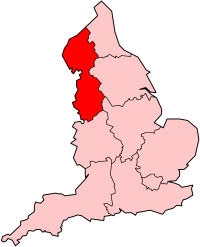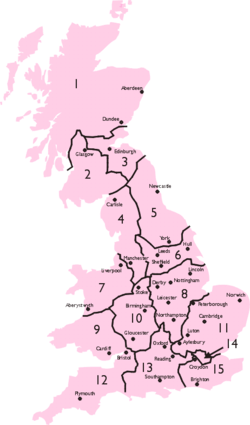NORWEB
Norweb plc, originally the North Western Electricity Board, was a British electricity supply and distribution company. It supplied electricity to about 4.7 million industrial, commercial and domestic customers in the North West of England, although Merseyside and parts of Cheshire were instead covered by MANWEB.
Formerly | North Western Electricity Board |
|---|---|
| Industry | Electric utility |
| Fate | Merged with North West Water to form United Utilities |
| Founded | 1948 |
| Defunct | 1995 (merged) 2001 (branding retired) |
| Headquarters | |
Area served | North West England |
History
Nationalised industry
The board was originally formed in 1948, as part of the nationalisation of the electricity industry by the Electricity Act 1947. The Board was responsible for the purchase of electricity from the electricity generator (the Central Electricity Generating Board from 1958) and its distribution and sale to customers. The key people on the Board were: Chairman R.F. Richardson (1964, 1967), Deputy Chairman F. Linley (1964, 1967), Full time member J.W.K. Evans (1967).[1]
The total number of customers supplied by the Board was as follows:[2][3]
| Year | 1948/9 | 1960/1 | 1965/6 | 1970/1 | 1975/6 | 1978/9 | 1980/1 | 1985/6 | 1987/8 | 1988/9 |
|---|---|---|---|---|---|---|---|---|---|---|
| No. of Customers, 1000s | 1259 | 1671 | 1793 | 1850 | 1914 | 1960 | 1979 | 2037 | 2065 | 2080 |
The amount of electricity, in GWh, sold by NORWEB Board was:[2][3]
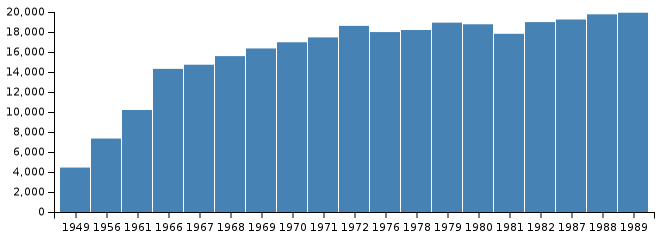
Post privatisation
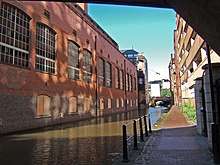
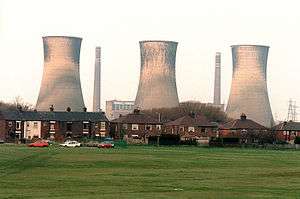
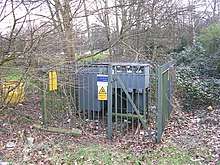
The assets of the Board passed to Norweb plc in July 1990, which was privatised in a stock market flotation later in the same year.
Norweb plc was acquired by North West Water plc in October 1995 for £1.83 billion. The combined water and electricity companies became United Utilities (UU). The customer base for the electricity supply arm was subsequently sold off in March 2000 to TXU, as Norweb Energi. TXU was itself acquired by Powergen in October 2002.[4]
The value electrical retailing arm "Norweb Retail" was sold to the Kingfisher Group in November 1996 for £51 million; seeing the closure of the Bolton head office, the CAS distribution centre in Worsley, the flagship Coventry 285, 57 high street stores and half of its out of town superstores. Remaining stores were rebranded under the name Comet.
UU retained the remainder of the company, including the distribution network in the northwest of England, as Norweb Distribution. In November 2001, Norweb was renamed United Utilities Electricity.
The company was the licensed Distribution Network Operator for the North West England, until its sale in December 2007 to North West Electricity Networks, a joint venture between Colonial First State, which is part of the Commonwealth Bank of Australia, and investment bank JP Morgan. Electricity North West Limited became the licensed Distribution Network Operator for the North West of England, as a consequence of the sale.
Headquarters
A new headquarters building for the board was built in 1963 on the site of the Dickinson Street power station in Manchester. The architects of this steel-framed building were Harry S. Fairhurst & Son. The project required the draining and infilling of an arm of the Rochdale Canal. The staircases, lifts and cloakrooms are in the eastern wing, separate from the offices.[5]
Cultural references
English Rugby league team Wigan Warriors had Norweb as their primary shirt sponsor between 1989 and 1999 (as TXU Energi between 1998 and 1999). This period saw Wigan win many trophies (including 6 of their 8 record consecutive Challenge Cup Final wins), with the Norweb brand gaining regular exposure on televised Rugby League due to Wigan's success over this time. Norweb also sponsored a tram on the Manchester Metrolink network (1026) which was named "The Power."
Norweb was also referenced in Red Dwarf, which was originally produced in Manchester. Holly, the on board computer of the mining ship Red Dwarf, played a practical joke on Dave Lister. According to Holly, the Norweb federation were looking for Lister for his crimes against humanity; leaving two half eaten sausages on his table before leaving, which over three million years had gone mouldy and now covered seven eighths of the earth's surface.
Lister also owns 98% of all the planet Earth’s wealth due to £17.50 left in his bank account that was subject to compound interest and hoarded so nobody else had any money save Norweb, as Lister had left a light on in the bathroom. This all results in a final 180 billion pound demand from Lister before Holly reveals his gag.
Norweb is referenced in the Frank Sidebottom (aka Chris Sievey) song "Electricity" which is on his LP "5:9:88". In the song Frank (supposedly) loses his electricity bill down a drain and he sings "I remember thinking I should inform Norweb now..." He heads off the Norweb office to address the matter but window shops and arrives too late.
When Frank returns home his electricity is cut off and his mum sends him to his room. The song is rather detailed and specifically mentions the location of a Norweb office in George Street, Altrincham in the Borough of Trafford. Apparently Sievey had experience with his electricity being cut off and this song, perhaps, conveys a real life situation.
References
- Electricity Council publicity brochure 1964 and 1967
- Electricity Council (1980). Handbook of Electricity Supply Statistics 1979. London: Electricity Council. pp. 58 63. ISBN 0851880762.
- Electricity Council (1990). Handbook of Electricity Supply Statistics 1989. London: Electricity Council. pp. 51 56. ISBN 085188122X.
- "Powergen buys up TXU UK". theguardian.com. 21 October 2002. Retrieved 22 September 2018.
- Sharp, Dennis, et al. (1969) Manchester. London: Studio Vista; p. 41
